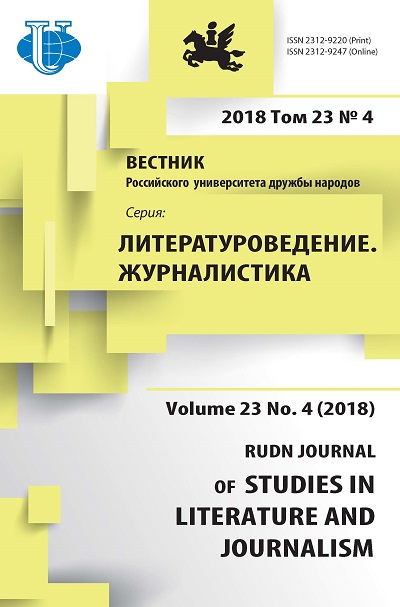Functions of the anthroponyms in the novels by Dina Rubina “Belaya golubka Kordovy” (The white dove of Cordoba”) and “Sindrom Petrushki” (The Punch Syndrome)
- Authors: Kikhney L.G.1, Silcheva A.G.1
-
Affiliations:
- Institute of International Law and Economy of A.S. Griboedov
- Issue: Vol 23, No 4 (2018)
- Pages: 402-409
- Section: LITERARY CRITICISM
- URL: https://journals.rudn.ru/literary-criticism/article/view/20448
- DOI: https://doi.org/10.22363/2312-9220-2018-23-4-402-409
- ID: 20448
Cite item
Full Text
Abstract
The article is devoted to the anthroponym function of the name “Silva” in two novels by Dina Rubina: “Belaya golubka Kordovy” (“The white dove of Cordoba”, 2009) and “Sindrom Petrushki” (“The Punch Syndrome”, 2010). The name “Silva” is repeated in the texts of these works and there are two characters which have it - in the first novel it’s a woman, in the second one it’s a man and the functions of these two characters are similar. The plot analysis and the character details comparison allows us to see the function homology: Silvas help to the main characters to “come to themselves”, “see themselves as are” and to “find themselves”. The novels “Belaya golubka Kordovy” (“The white dove of Cordoba”) and “Sindrom Petrushki” (“The Punch Syndrome”) are the parts of the trilogy “Lyudi vozdukha” (“Air people”), the main theme of which is the description of the people who have unusual characteristics. The “Silvas” characters help to the main character to compensate this “unusuality” and to have a chance for a “normal” life. The images of Silvas take to the text the motives of “alien name”, “alien child” and the theme of father-child relationship. Besides the episode function of the “Silvas” both characters concentrate in themselves the motives which are communicated with the fate of the main hero, tragic o happy final of the novel. The name “Silva” also has an intertextual communication with the “Silva” (“Chardash Queen”) operetta, the plot of which is also used in the novels “Belaya golubka Kordovy” (“The white dove of Cordoba”) and “Sindrom Petrushki” (“The Punch Syndrome”) by Dina Rubina.
Keywords
About the authors
Lyubov’ Gennadyevna Kikhney
Institute of International Law and Economy of A.S. Griboedov
Author for correspondence.
Email: lgkihney@yandex.ru
Doctor of Philology, Professor, Institute of International Law and Economy of A.S. Griboedov
21 Shosse Entuziastov, Moscow, 111024, Russian FederationAlina Georgievna Silcheva
Institute of International Law and Economy of A.S. Griboedov
Email: alinkakrasulka@mail.ru
PhD student, Institute of International Law and Economy of A.S. Griboedov
21 Shosse Entuziastov, Moscow, 111024, Russian FederationReferences
- Zinukhov A.I. Medovyi mesyats imperatora [The honeymoon of the emperor]. https://www.sovsekretno. ru/articles/id/857/ (date of address: 10.10.2018).
- Kovalenko A.G. Literatura i postmodernism. Uchebnoe posobie [The literature and postmodernism. The manual for the studens]. Мoscow: RUDN Publ., 2004.
- Kononova N.O., Temirshina O.R. “Otchayannye romantiki”: evolutsiya mifa ob Aide i Persefone ot grekov k prerafaelitam i A. Belomu [“The desperate romantics”: the evolution of the myth of Aid and Persephone from the Greeks to the pre-Raphaelites and Andrey Belyi].Vestnik RUDN. Seriya: Literaturovedenie. Zhurnalistika [RUDN Journal of Studies in Literature and Journalism]. 2018. No. 3. Pp. 255—267.
- Rubina D. Belaya golubka Kordovy [The white dove of Cordoba]. Мoscow: Izdatelstvo “E”, 2008. 624 p.
- Rubina D. Sindrom Petrushki [The Punch Syndrome]. Мoscow: Izdatelstvo “E”, 2017. 512 p.
- Rudenko I.V. Pushkin i Romaniovy [Pushkin and Romanovs]. https://www.samara.kp.ru/ daily/26088.4/2989291/ (date of address: 10.10.2018).
- Shafranskaya E.F. Sindrom golubki: mifopoetika prozy Diny Rubinoi [The dove syndrome: the mythopoetics of the prose by Dina Rubina]. Saint Petersburg, 2012. 400 p.
Supplementary files















